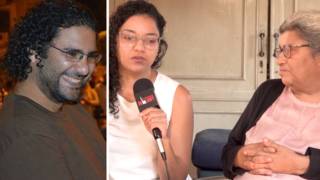
In a wide-ranging interview recorded in Cairo, we speak with Laila Soueif and Sanaa Seif, the mother and sister of British-Egyptian political prisoner Alaa Abd El-Fattah, about his health, his case, his family and his hopes for freedom. After visiting him in prison, they describe how El-Fattah started a water strike on the first day of the U.N. climate conference in Sharm el-Sheikh to draw international attention to the country’s human rights violations and protest his seemingly indefinite imprisonment. He paused after collapsing and suffering a “near-death experience” when prison officials appeared reluctant to record his full water and hunger strike. Seif says they set a date to restart his hunger strike, once he regains physical and mental strength. Laila Soueif discusses how El-Fattah helped her raise his two younger sisters when her now-deceased husband was in jail for his own activism. They also describe his relationship with his son, Khaled, who is nonverbal and diagnosed with autism, calling El-Fattah a “patient, kind father.” Recalling his most recent trial, they lay out how he was sentenced to five years in prison last December, and explain how El-Fattah’s lawyers never had access to the case trial or were allowed to argue his case. “There is clearly a vendetta” against El-Fattah, notes Seif, who adds “it’s pointless to talk about the legal procedures [since] each step of it is a sham.” Seif also speaks about the mass imprisonment of other political prisoners and the major influence and responsibility the U.S. has in freeing El-Fattah and others. “This whole operation [in Egypt] is a U.S. operation,” says Soueif, who says she wants El-Fattah freed and deported to the U.K. to keep him safe.
This content originally appeared on Democracy Now! and was authored by Democracy Now!.